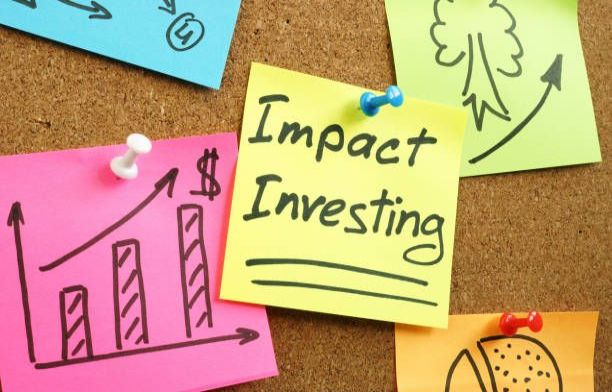Investing for Impact: Everything You Need to Know About Impact Investing

"Be the change you wish to see in the world."
Many of us have heard this Mahatma Gandhi quote more times than we can count and perhaps even been inspired by it. It's a beautiful sentiment and one that reminds us how everyone has the power to make a real impact in the spaces that we operate in. What most people don't know is that making an impact goes beyond donating money and volunteering; it can also extend to investments. Impact investing is a way to effect the social/environmental change you wish to see while also putting your dollars to work.
If you're interested in learning the ins and outs of this form of investing, please read on. Then, you'll discover a few tips to build a sustainable impact investing portfolio.
Impact Investing Explained

Everyone can agree that impact investing is on the rise. IFC's latest estimate of the global market for impact investments shows that $2.3 trillion were invested for impact in 2020 alone. However, despite this growing interest, not everyone can agree on what "impact investing" actually means.
Impact investing is simply a way to do more with your investment dollars. Put differently, it's a way to align your investments with your philanthropic and personal values while realizing financial returns.
The goal is to, whenever possible, use your investment dollars to promote positive societal impact, corporate responsibility, and long-term financial return. It's the classic case of killing two birds with one stone, only that in this case, your intentions are more altruistic. So, for example, if you're interested in reducing the disposal of plastic waste, you might invest in funds focused on companies that produce renewable, innovative, plastic-free solutions.
Growth in impact investing in recent years can be attributed, in large part, to the growing interest among young people and among the wealthy. About one-third of millennials often or exclusively use investments that take ESG factors into account, compared with 19% of Gen Z, 16% of Gen X, and 2% of baby boomers. In other words, impact investing could be the next big thing in the investment world (if it's not one already).
Core Characteristics of Impact Investing

Impact investing is unlike any other form of investing out there. That's because it strictly adheres to the following tenets:
Intentionality
If you're in it for the money, then you might as well pursue other investment forums. Impact investing is marked by an intentional desire to contribute to specific and measurable social or environmental outcomes.
Investment with return expectations
With impact investing, you're not merely throwing your precious dollars into a black hole. Rather, you're diving in with a firm expectation that you'll generate a financial return on capital, or at the very least, a return on capital. In as much as impact investing is an altruistic endeavor, it's also an investment opportunity and should be treated as one.
Impact management and measurement
In the field of impact investing, impact measurement matters as much as the endeavor itself. Your role as the investor is to measure the social and environmental performance and progress of underlying investments and report on them accordingly. This includes having feedback loops in place and ensuring others in the investment chain are effectively managing their investments towards impact.
Why Impact Investing?

Impact investing packs a slew of benefits—some tangible and quantifiable, others less so but still important. Here are a few notable benefits of impact investing:
1. Good for the planet, good for your wallet
There's a myth that finance and ethics don't mix. For a long time now, people have been made to believe that impact investing inevitably leads to weaker returns. That couldn't be any further from the truth.
Numerous studies over the past decade show that impact investing achieves similar or even superior to traditional investments. Research carried out in 2020 showed that 68% of companies that embraced sustainable investment strategies fully met their financial goals, while 20% exceeded them. In other words, your chances of coming out empty-handed with impact investment are incredibly slim.
2. Provides an avenue for promoting the corporate practices that matter to you
"Put our money where our mouth is" is a saying we've heard since we were kids. If a particular company doesn't believe in and share common values with us, we are often inclined to distance ourselves from it.
The same goes for the investment world. Having a "socially responsible portfolio" and applying an impact-oriented investment strategy allows you to protect yourself from bad actors while encouraging practices and values that are important to you. You'll no longer be a spectator on critical issues such as gender inequality, climate change, general malpractice, and the like.
And you won't be the only one. A recent survey of 1,800 individuals in the UK revealed that 56% had at least a moderate interest in impact investing. Another report from Deloitte explains that "the percentage of retail and institutional investors who apply ESG principles to at least a quarter of their portfolios had increased from 48% in 2017 to 75% in 2019." There's every chance this percentage has grown significantly by now.
3. Less volatile investments
The investment world is fraught with risks. If it's not the high-profile negative events that pop out of nowhere, it's the constant fluctuation of stock prices that often leave investors grasping at straws. Delving into impact investing reduces the overall volatility of your portfolio, enabling you to better anticipate and deal with "unknown unknowns." The Coronavirus pandemic is proof enough that "socially aware" companies can thrive amidst market upheavals.
How to Get Started with Impact Investing

With the emphasis being something beyond pure profit, you might wonder if you can make money with impact investing. The answer is yes. Below are five tips to help out.
1. Carve out your area of impact
Which social and environmental issues do you care most about? If you're passionate about biodiversity loss and climate change, you'll want to invest in assets and stocks that specifically cater to that. Determining where you want to create an impact from the get-go can go a long way in helping you make wise investment choices later on.
2. Learn the lingo and do your due diligence
It would also be helpful to familiarize yourself with the many acronyms and terminologies present in the impact investing sphere.
As you'll likely learn, there are many different ways to participate in impact investing—from venture capital funds that finance social enterprises to EFTs (exchange-traded funds) and mutual funds that screen out companies according to certain criteria. Having a basic level of knowledge of the terminology used to discuss such investments will help you evaluate your choices and figure out what makes sense for you.
3. Decide on the kind of portfolio you want
DIY or no DIY? That's the question as you set out on creating a portfolio for your impact investments. If you choose to create your own portfolio, understand that it requires a lot of heavy lifting and research. At a minimum, you'll need to have a brokerage account. This is where your investments will reside and where you can purchase and sell specific assets.
If, however, you choose to go with a robo-advisor (an algorithm-based digital service that manages investments on your behalf), you'll have your work cut out for you. Most robo-advisors offer a variety of socially responsible portfolios that you can choose from. Some even offer specialized impact portfolios, so you can pick one that drives the most impact in the areas you care most about.
4. Find impact investments that make sense to you.
The next step towards impact investing is deciding which funds to build a portfolio with. If you want total control over your investments, mutual funds are your best bet. That said, take caution not to end up with mutual funds that have weak ESG scores.
To make sure you're walking away with the right deal, look through a fund's holdings (a list of companies it invests in) as well its expense ratio. An expense ratio is an annual fee expressed as a percentage of your investment—or, like the term implies, the ratio of your investment that goes towards the fund's expenses. So if you invest in a mutual fund with a 1.5% mutual ratio, you'll pay the fund around $15 per year for every $1,500 invested. It's also worth noting that ETFs generally tend to have lower expense ratios than mutual funds.
You could also opt to buy individual stocks in companies that have a mission you want to support. To figure out if a certain company is a right fit for you, examine its sustainability report. It's even better if you can learn how the company's employees rate the work culture, and you can do this by visiting sites like Glassdoor.
5. Regularly monitor fund performance.
A vital step in impact investing is making sure the funds are performing up to expectations. Make sure all the work that went into selecting the right fund doesn't go down the drain by failing to properly monitor the fund. This will help you determine which funds are worth owning and which ones maybe be better to trade out for new ones.
Set a monitoring schedule with monthly, quarterly, and annual reviews. If you're working with a financial advisor, make sure you're getting regular reports on how your funds are performing. You could also ask for advice on steps that might be beneficial going forward.
Get Started with Bay Street
Want in on Impact Investing? Bay Street Capital Holdings Has Got You Covered.

Bay Street Capital Holdings is an independent advisory, wealth management, and financial planning firm headquartered in Palo Alto, CA. They manage portfolios with the goal of maintaining and increasing total assets and income with a high priority on managing total risk and volatility. Although many advisors may focus on maximizing returns, they place a higher priority on managing total risk and volatility.
Our founder, William Huston, founded Bay Street after 13 years of supporting the United States' largest retirement plan ($650B) Thrift Savings Plan. He is recognized as Investopedia's Top 100 Financial Advisors for 2021. In California, only two black-owned firms out of nineteen firms received this recognition.
Bay Street is currently a member of UNPRI, Intentional Endowments, Due Diligence 2.0 Commitment, and is one of very few financial advisory firms with 100% 5-star client testimonials. In 2021, Bay Street was selected as a finalist out of over 900 firms across the US in the category of Asset Manager for Corporate Social Responsibility (CSR).
Does this sound like a firm you'd want to partner with?
Schedule a meeting with Bay Street today to review impact investments that'd best fit your financial and CSR goals.
Sources
https://hbr.org/2019/01/calculating-the-value-of-impact-investing
https://www.nerdwallet.com/article/investing/impact-investing
https://www.phenixcapitalgroup.com/what-is-impact-investing
https://www.bridgespan.org/insights/library/impact-investing/what-is-impact-investing
https://www.forbes.com/advisor/investing/impact-investing/





















